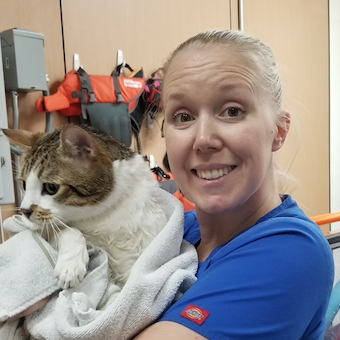Clinic culture seems to be talked about a lot lately, and for good reason. A recent study cites toxic culture as the biggest driver for workers leaving their jobs, and while this study was done across industries, the same idea can be applied to veterinary medicine.
When many of us start talking about workplace culture, we often talk about what our bosses or managers are doing to provide a safe and inviting work environment for their employees. While this is surely a crucial aspect of talking about culture and culture change, it can often make anyone who is not in a management-level position feel powerless about the change they can create in their workplace.
As an associate, I’ve personally felt like I had no real power or ability to change the culture at my practice. And that belief is exactly what kept me feeling overwhelmed and powerless against making any changes in my workplace.
“I’m just an associate. What can I really do to change things around here?”
The truth is — you DO have the power to affect culture in your practice!
Every one of us has a role in affecting how the veterinary team functions, how we all support each other, and how well the team thrives.
Below are some things I learned about how to affect clinic culture from the role of “just” an associate:
3 Reasons Associate Veterinarians Can Help Shape the Practice Culture:
1. As an associate vet, you’re more relatable because you’re not part of “management.”
The truth is, while most managers would love to believe they have an “open-door policy,” bringing up issues to your bosses or management can be scary and intimidating 😳 — especially for support staff or other veterinarians that have not been there as long as you.
I often found that more staff are willing to be open with me about what they’re struggling with and problems they see, which gives me a different perspective about how we can better support the staff.
2. As an associate vet, your thoughts and actions can still impact the people around you
Good culture comes down to ALL of us making each other feel safe, heard, and respected. ❤️
Whenever I show compassion to my clients, to my coworkers, whenever I set a boundary, whenever I model good communication skills and self-care, other people are watching.
Even if I am not directly in charge of creating rules and responsibilities, I can still set an example of how I want to see everyone else in the practice be treated.
3. As an associate vet, you can serve as a good liaison between different groups of people.
As much as I’d love to see every member of the team’s opinions hold equal value, it’s not uncommon for concerns to be taken more seriously when they come from a doctor.
Use this to your advantage! 😎
Because I’m more relatable to some of the other support staff (see point #1), I can be a bridge between them and management and be a voice for some people who felt too nervous about speaking up on their own.
Be the change you wish to see.
So, if you’re an associate at your practice and feel like you aren’t able to impact the culture at your veterinary hospital - think again!
Want to learn more about healthy practice culture? Read The Ultimate Guide to Awesome Culture in Veterinary Medicine
There are so many ways that associate doctors can contribute to the team and make our workplaces more nurturing places to work in.



.jpg)
.gif)


